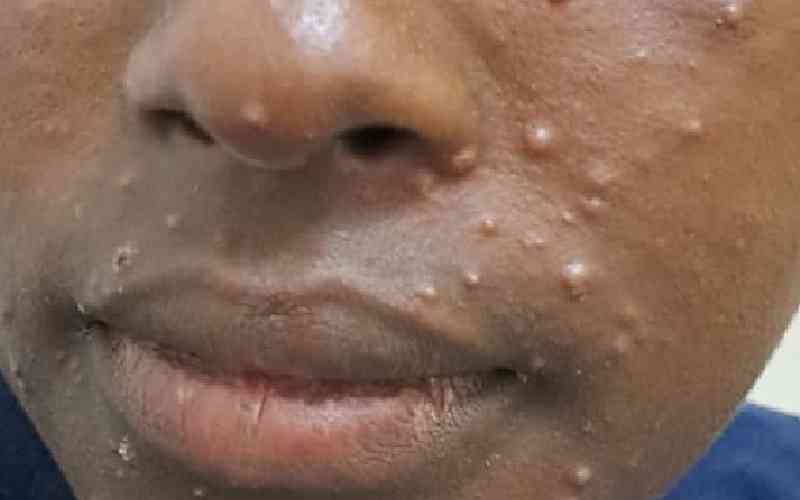
A suspected case of mpox is being investigated after a patient was referred from a private hospital in Murang'a to Thika Level Five Hospital.
Kiambu Health CEC Elias Maina indicated that swab samples from the patient were taken and are currently undergoing analysis at the National Public Health Laboratories to confirm the diagnosis.
"The county through the Department of Health Services has activated all necessary measures to ensure the safety and wellbeing of the residents of Kiambu county," said Dr Maina.
Initial reports indicate the patient is a 21-year-old woman who has been in contact with several individuals, including customers and drivers from Uganda, Tanzania, Bungoma, Sondu Miriu, and Nandi Hills.
This comes as the African continent faces a new health crisis after the African Centers for Disease Control and Prevention (Africa CDC) declared mpox, formerly known as monkeypox, a continent-wide public health emergency.
Mpox, a highly contagious disease, is transmitted through close contact such as sex, skin-to-skin contact and talking or breathing close to another person, causing flu-like symptoms and skin lesions.
- The viral threats everyone should watch in 2026
Keep Reading
Outbreak epicentre
Since January, Africa has reported over 13,700 cases, resulting in 1,500 deaths and infecting 40,000 people.
The Democratic Republic of Congo (DRC) has emerged as the epicentre of the outbreak, with at least 450 lives lost in the country alone.
The disease has also spread to neighbouring nations including Burundi, the Central African Republic, Kenya, and Rwanda.
Dr Matshidiso Moeti, World Health Organization (WHO) Regional Director for Africa, stated, "We are hard at work on the frontlines of the response, collaborating closely with governments and communities to strengthen mpox control measures and are ramping up efforts to curb the widening trend of the virus through coordinated action with partners and national authorities."
The current outbreak is particularly alarming due to the emergence of new, more virulent strains of the virus.
Two variants, Clade 1a and 1b, are circulating in central Africa with a combined case fatality rate of around three per cent, according to the latest data from the Africa CDC.
This mpox outbreak is the latest in a series of health crises that have afflicted the African continent. Over the years, Africa has grappled with numerous disease outbreaks and pandemics, including smallpox, cholera, Ebola, measles, polio, and most recently, Covid-19.
The 2014 Ebola outbreak that affected three West African nations - Guinea, Liberia and Sierra Leone, remains one of the most devastating of its kind, with Nigeria, Senegal and Mali also reeling in the mire. Italy, the United States, the United Kingdom and Spain also recorded cases and deaths.
Socio-political challenges
Prof Piero Olliaro, a researcher at the Oxford University studying mpox in the Central African Republic, emphasised the complexity of the situation.
"Mpox is almost the archetype of these complex outbreaks that have not been dealt with properly and have the potential for spreading, creating more problems locally and nationally. We need a much more systematic approach," he said.
The severity of the outbreak is exacerbated by challenging socio-political conditions in the affected regions.
The eastern DRC, where the Clade 1b variant has emerged, is plagued by violent conflicts involving local and foreign militia groups, leading to forced migration and increased regional virus transmission.
The displacement of local populations, who end up in refugee camps in neighbouring countries - including Kenya - have contributed to the spread of mpox and other zoonotic diseases in the region.
Malnutrition, unprotected sex, and untreated conditions like HIV and AIDS further compound the problem.
Dr Paul Ochanda Saoke, an expert in tropical diseases, warns that the new variant is particularly deadly and can be transmitted from animals to humans and between humans.
"If you notice symptoms such as fever, muscular aches, boils and small lesions on your skin, see a doctor immediately."
To prevent the disease, Saoke recommends avoiding contaminated materials, thoroughly cooking game meat, washing hands with soap and hot water and using condoms.
He also advises thorough screening of people from Uganda, Rwanda, Burundi, and DRC at the moment, as these countries border the DRC, the mpox disease epicentre.
Africa in despair
Despite the urgency of the situation, Africa faces significant hurdles in accessing necessary treatments and vaccines.
The continent's experience during the Covid-19 pandemic, where it struggled to secure adequate vaccine supplies, seems to be repeating itself with mpox.
Bavarian Nordic, the manufacturer of the JYNNEOS vaccine currently recommended against mpox, has stated that it has no plans to sell or manufacture its vaccine directly to African countries.
Rolf Sass Sorensen, vice president of investor relations at Bavarian Nordic, said, "It's very unlikely that any African country will ever be responsible for buying vaccines. Vaccines to Africa will come from donations from organisations and countries."
This stance has raised concerns about equitable access to vaccines for African nations.
While the US has offered to donate 50,000 doses of the vaccine from its stockpiles, and the European Union has announced a donation of 175,000 doses, these numbers fall far short of what experts believe is needed to effectively combat the outbreak.
Additional reporting by Ayoki Onyango and Gitau Wanyoike
 The Standard Group Plc is a multi-media organization with investments in media
platforms spanning newspaper print
operations, television, radio broadcasting, digital and online services. The
Standard Group is recognized as a
leading multi-media house in Kenya with a key influence in matters of national
and international interest.
The Standard Group Plc is a multi-media organization with investments in media
platforms spanning newspaper print
operations, television, radio broadcasting, digital and online services. The
Standard Group is recognized as a
leading multi-media house in Kenya with a key influence in matters of national
and international interest.











